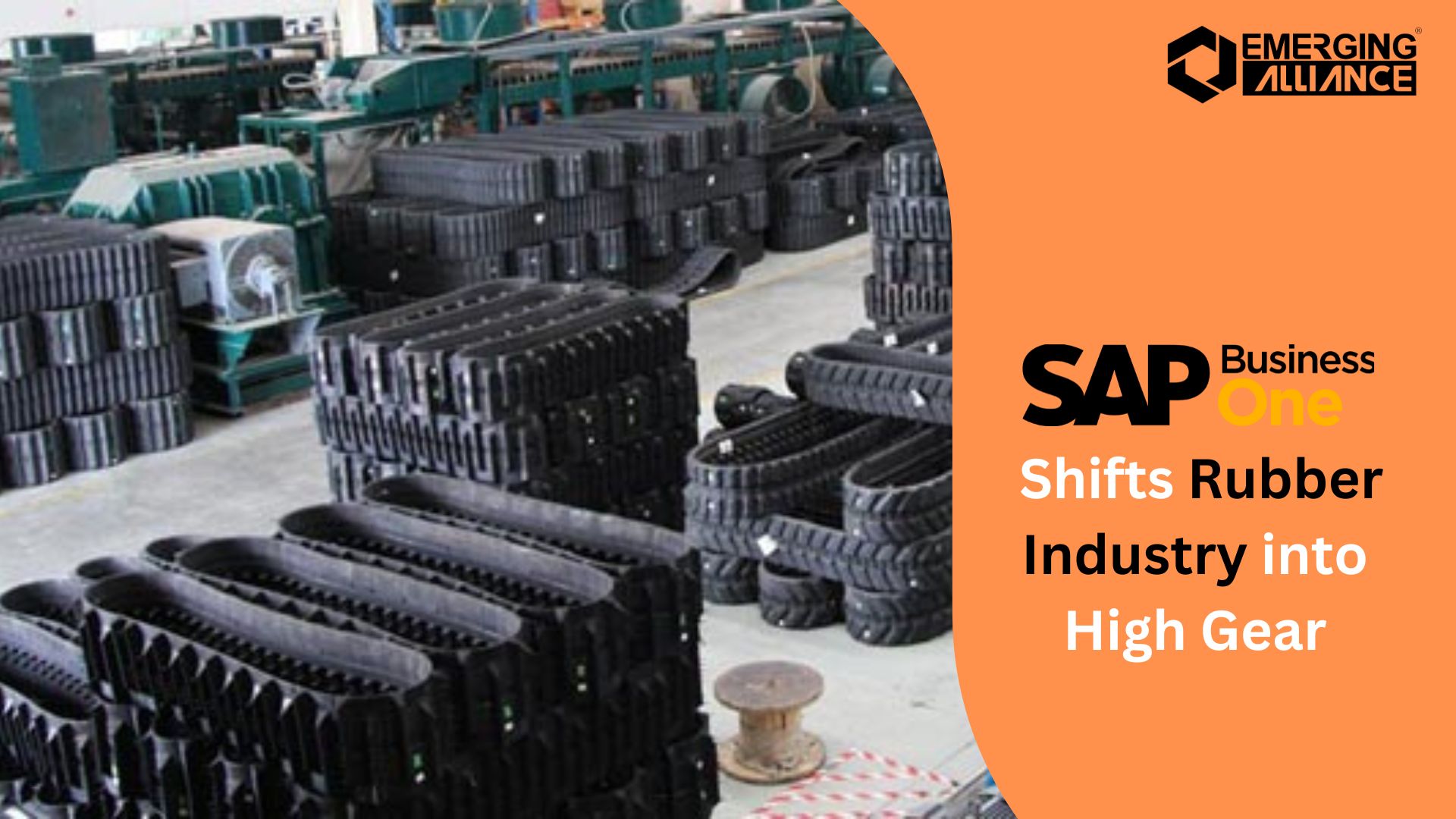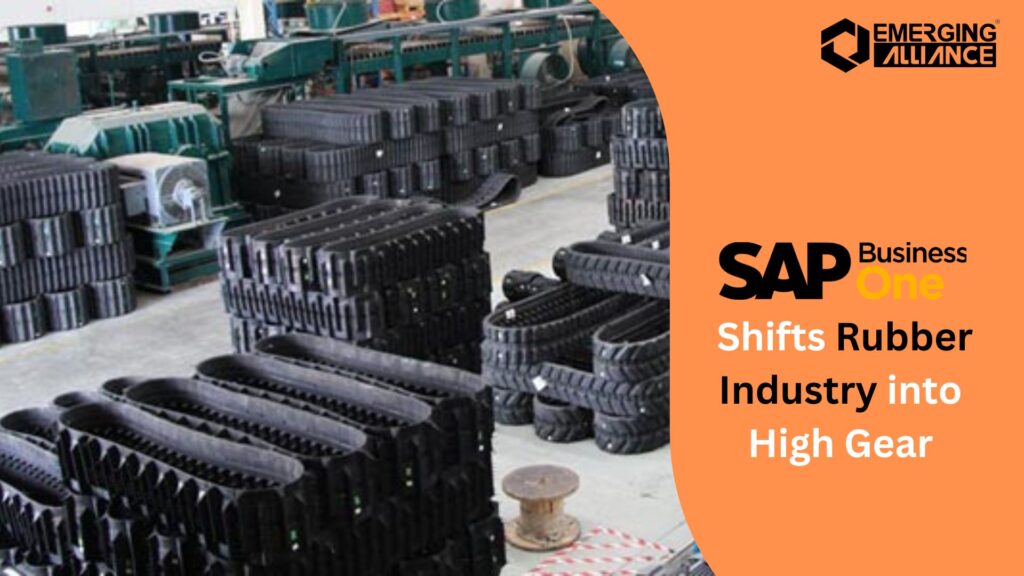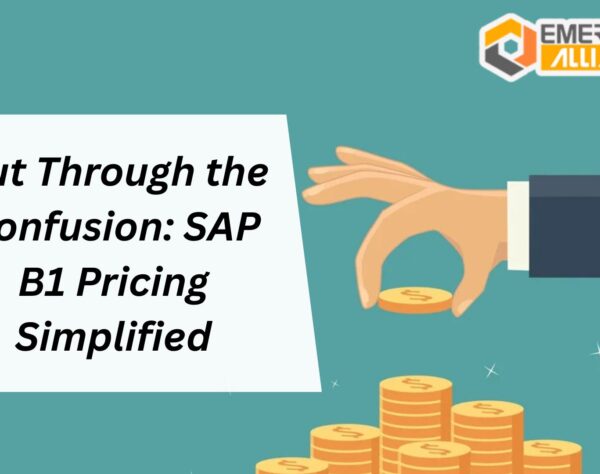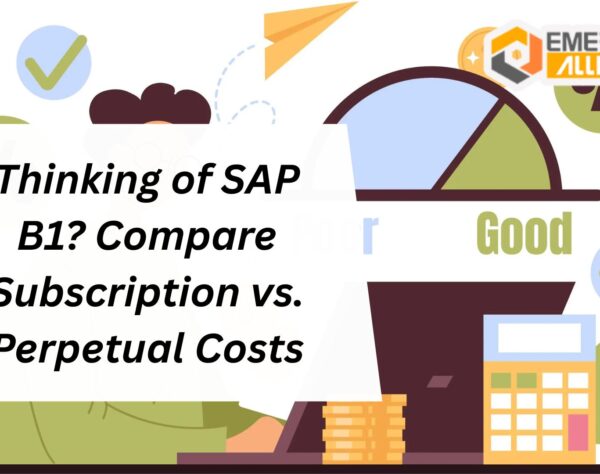
SAP Business One Shifts Rubber Industry into High Gear

Efficiency in Motion with SAP B1 for Rubber Industry
The rubber industry is a complex and competitive sector that requires businesses to be agile, adaptable, and efficient. To stay ahead of the competition, rubber industry businesses need to shift their operations into high gear, streamlining their processes, improving their productivity, and reducing their costs. In this blog post, we will explore how SAP Business One (SAP B1) can help rubber industry businesses shift their operations into high gear.
Navigating the Complexities of for Rubber Industry
Before diving into how SAP B1 addresses these challenges, it’s crucial to understand the specific obstacles that rubber manufacturers face. These issues range from complex production processes to fluctuating market demands, and they require agile solutions to navigate successfully.
- Raw Material Price Volatility: Rubber manufacturers depend heavily on raw materials like natural rubber, synthetic rubber, chemicals, and fillers. These materials are subject to price fluctuations, availability issues, and changes in supply and demand. Managing costs and maintaining profitability while dealing with this volatility can be challenging.
- Production Complexity: The rubber manufacturing process involves multiple stages—mixing, molding, curing, and finishing. Each step requires precise coordination of machinery, labor, and raw materials. Any inefficiency or breakdown in this complex system can delay production and increase costs.
- Demand Forecasting and Inventory Management: Predicting market demand and managing inventory is another significant challenge. Companies must ensure they have enough raw materials and finished products on hand to meet customer demand without overstocking, which can result in waste and storage costs.
- Cost Control and Profitability: Rubber manufacturers often face pressure to minimize production costs while maintaining high quality. Balancing labor, material costs, energy consumption, and overhead can be difficult without effective tools for tracking and controlling expenses.
- Regulatory Compliance: With increasing concerns about environmental impact and product safety, rubber manufacturers must adhere to strict regulations. Whether it’s monitoring emissions or ensuring product quality standards, maintaining compliance is a constant challenge.
How SAP Business One Addresses the Challenges of the Rubber Industry
SAP Business One is a comprehensive ERP system designed to centralize business processes and provide real-time insights into company performance. By integrating key functions such as procurement, production, inventory management, financial accounting, and customer relationship management (CRM), SAP B1 helps rubber industry businesses tackle their unique challenges head-on.
Optimizing Procurement and Supply Chain Management
The rubber industry’s reliance on raw materials—often sourced from different suppliers across the globe—means that supply chain disruptions can have a direct impact on production timelines and costs. SAP B1 integrated supply chain management tools offer several features that help businesses streamline procurement, manage suppliers, and improve inventory control.
- Supplier Performance Management: SAP B1 allows businesses to track and evaluate supplier performance based on delivery times, material quality, and cost efficiency. This enables manufacturers to make data-driven decisions when selecting suppliers and negotiating terms.
- Inventory Management in Real Time: With SAP B1, businesses can track inventory in real time, ensuring they always have the right amount of raw materials on hand to meet production demands. Automated alerts notify businesses when stock levels fall below predefined thresholds, triggering purchase orders to avoid stockouts.
- Automated Reordering and Purchase Orders: Based on real-time data and production forecasts, SAP B1 can automatically generate purchase orders to restock materials, ensuring continuous production without overstocking or excessive inventory accumulation.
- Demand Forecasting: SAP B1 helps businesses predict future demand using historical sales data and market trends. Accurate forecasting enables companies to plan procurement more effectively and reduce the risk of stockouts or excess inventory.
By improving procurement efficiency and inventory control, SAP B1 helps rubber industry businesses maintain smooth operations, reduce costs, and avoid costly production delays.
Enhancing Production Efficiency and Scheduling
The rubber manufacturing process involves several distinct stages, each requiring careful management of resources, machinery, and labor. SAP B1’s production planning and scheduling tools help rubber manufacturers optimize this process, ensuring that production runs smoothly and on schedule.
- Production Scheduling: SAP B1 enables manufacturers to create detailed production schedules based on demand forecasts, material availability, and machine capacity. This helps allocate resources more efficiently and reduce downtime.
- Work Order Management: SAP B1 automates work order creation, assigning tasks to the right resources and ensuring that production is aligned with demand and available materials. Work orders can be tracked in real-time, allowing businesses to monitor progress and address any issues promptly.
- Capacity Planning: SAP B1 provides insights into machine utilization and labor productivity, allowing businesses to better allocate resources and avoid overburdening any single machine or employee. This helps prevent production bottlenecks and ensures that deadlines are met.
- Real-Time Production Tracking: The system allows businesses to track the progress of production in real time. If there are any delays or issues, these can be quickly identified and addressed, minimizing disruption and keeping production on track.
By enhancing production scheduling and resource allocation, SAP B1 helps rubber manufacturers boost operational efficiency, reduce costs, and increase overall productivity.
Achieving Cost Control with SAP Business One Financial Management Tools
Cost control is critical for profitability in the rubber industry, where raw material prices, labor costs, and energy consumption are key expenses. SAP B1’s financial management features help businesses manage costs, track expenses, and maintain profitability by providing real-time visibility into financial data.
- Real-Time Cost Tracking: SAP B1 allows businesses to monitor raw material costs, labor costs, energy consumption, and overhead in real time. This gives manufacturers the ability to pinpoint inefficiencies and reduce unnecessary expenses.
- Costing Methods: SAP B1 supports both standard costing (for budget forecasting) and actual costing (for post-production analysis). These features provide valuable insights into the true cost of production and help businesses refine their budgeting and pricing strategies.
- Profitability Analysis: SAP B1 offers detailed profitability analysis at the product, customer, and region levels. This helps businesses identify their most profitable products, customers, and markets, enabling better resource allocation and more strategic decision-making.
- Financial Reporting: SAP B1 generates customizable financial reports that provide an overview of cash flow, revenue, and expenses. These reports give business owners and managers the data they need to make informed financial decisions and adjust strategies as necessary.
By providing comprehensive financial insights, SAP B1 helps businesses control costs and make more informed financial decisions, ultimately boosting profitability.
Improving Customer Relationship Management (CRM)
In an increasingly competitive market, maintaining strong relationships with customers is crucial. SAP B1’s CRM module helps businesses manage customer interactions, track sales leads, and provide exceptional service.
- Sales Opportunity Management: SAP B1 allows businesses to capture and track sales opportunities, helping sales teams stay organized and follow up on leads in a timely manner. This improves the chances of closing deals and growing the customer base.
- Order Management: SAP B1 streamlines the order processing system, ensuring that orders are tracked accurately from initiation to delivery. This reduces errors, improves customer satisfaction, and ensures timely order fulfillment.
- Customer Support: SAP B1 tracks customer service requests, allowing businesses to resolve issues quickly and keep customers satisfied. The system helps businesses deliver better customer service, leading to improved customer retention.
- Customer Analytics: With detailed customer data at their fingertips, businesses can use SAP B1 to analyze purchasing patterns, customer behavior, and market trends. This data can be used to create targeted marketing strategies, improve sales tactics, and increase customer loyalty.
SAP B1 helps rubber manufacturers improve customer satisfaction, loyalty, and sales by effectively managing customer relationships.
Ensuring Compliance with Regulatory Standards
The rubber industry is subject to various regulatory requirements, including environmental standards, product quality regulations, and safety standards. SAP B1 helps businesses comply with these regulations by offering powerful compliance and reporting tools.
- Environmental Compliance: SAP B1 helps track key metrics such as energy consumption, waste generation, and emissions, ensuring that businesses comply with environmental regulations and sustainability initiatives.
- Quality Control Reporting: SAP B1’s quality control module enables businesses to track product quality throughout the production process. The system generates detailed reports on product defects, quality issues, and non-conformances, helping businesses maintain high-quality standards and avoid costly mistakes.
- Audit Trails: SAP B1 maintains an audit trail for all transactions, ensuring that businesses have the necessary documentation for compliance audits. This transparency helps ensure that businesses adhere to industry standards and regulations.
By providing the tools to monitor and report on compliance, SAP B1 helps businesses mitigate regulatory risks and maintain their reputation for quality and sustainability.
Scalability and Flexibility for Future Growth
As the rubber industry evolves, businesses need an ERP solution that can grow with them. SAP B1 is scalable and flexible, making it ideal for businesses looking to expand, diversify, or enter new markets.
- Modular Structure: SAP B1’s modular design allows businesses to add new functionalities as their needs grow. Whether a company is expanding into new regions, adding new product lines, or upgrading its processes, SAP B1 can be customized to meet evolving requirements.
- Cloud-Based Deployment: SAP B1 offers cloud deployment, enabling businesses to access real-time data from anywhere, anytime. Cloud deployment also reduces IT maintenance costs and ensures that businesses have access to the latest features and updates.
- Multi-Language and Multi-Currency Support: SAP Business One offers global manufacturers a flexible solution with multi-language and multi-currency support for seamless international operations.
Accelerating Rubber Industry with SAP Business One
SAP Business One helps rubber manufacturers optimize operations, reduce costs, and improve decision-making, addressing key challenges such as supply chain disruptions and production inefficiencies.
By implementing SAP B1, rubber industry businesses can shift into high gear, enhancing productivity, profitability, and customer satisfaction. As companies grow and evolve, SAP B1’s flexibility and scalability make it the ideal solution for driving long-term success in the rubber industry.
Ready to begin your journey to higher profits? Let SAP Business One lead the way. Contact us today at www.emerging-alliance.com for a personalized demo and see the difference automation can make!
Looking for professional guidance? Complete the form below and let’s connect soon!







